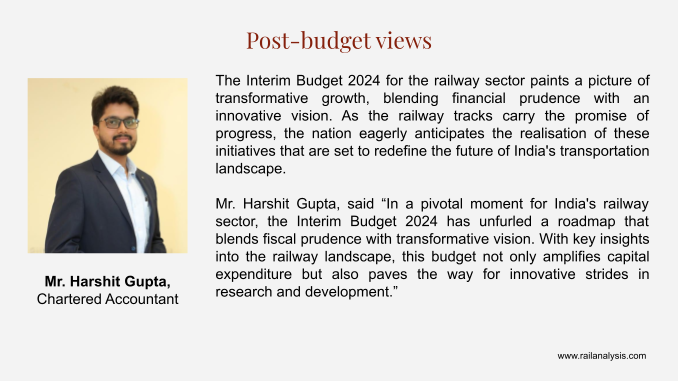
The Interim Budget 2024 for the railway sector paints a picture of transformative growth, blending financial prudence with an innovative vision. As the railway tracks carry the promise of progress, the nation eagerly anticipates the realisation of these initiatives that are set to redefine the future of India’s transportation landscape.
Budget Insights:
Mr. Harshit Gupta, said “In a pivotal moment for India’s railway sector, the Interim Budget 2024 has unfurled a roadmap that blends fiscal prudence with transformative vision. With key insights into the railway landscape, this budget not only amplifies capital expenditure but also paves the way for innovative strides in research and development.”
About Mr. Harshit Gupta: With over a decade of comprehensive expertise, Mr. Gupta is a distinguished professional holding qualifications as a Chartered Accountant, MBA in Finance, and DISA certification from the ICAI. Throughout his illustrious career, he has exhibited exceptional proficiency across diverse financial domains.
His tenure includes impactful roles at renowned organisations such as Deloitte, Nexdigm (Formerly SKP), Doubtnut, and Deutsche Bahn (RRTS Delhi-Meerut), where he has consistently delivered excellence.
Here’s a closer look at some of the major revelations within the Railway Sector:
Surge in Capital Expenditure:
The Interim Budget for 2024 has earmarked a significant boost in capital expenditure for the railway sector, with an allocation of Rs. 11.11 Lakhs Crores. This injection of funds signifies a concerted effort to fortify and modernise the backbone of India’s transportation network.
Revolutionary Interest-Free Loans:
A groundbreaking move is the establishment of a 71-lakh crore corpus, accompanied by a 50-year interest-free loan for the private sector. This financial infusion is poised to catalyse research and innovation, positioning the railway sector at the forefront of technological advancement and efficiency.
Taxation Stability:
The budget maintains a steady course in terms of taxation, with no proposed changes to tax rates for both direct and indirect taxation, including import duties. This strategic decision ensures a stable economic environment, offering continuity and predictability for businesses and individuals alike.
Major Announcements Transforming Railway Dynamics:
Vande Bharat Revolution:
Finance Minister Sitharaman’s announcement of the conversion of 40,000 normal rail bogies into Vande Bharat heralds a new era for passenger safety, convenience, and comfort. This transformative initiative underscores a commitment to enhancing the travel experience for millions of passengers.
Expansion of Key Infrastructure Projects:
The Interim Budget charts an expansive path for key rail infrastructure projects, notably the expansion of Metro Rail and Namo Bharat to additional cities. The Regional Rapid Transit System (RRTS), inaugurated by Prime Minister Narendra Modi, is set for further extension, connecting more regions, and fostering rapid urban development.
Three Critical Railway Corridors:
Acknowledging the vital role of rail connectivity, three major railway corridors have been unveiled. These include the port connectivity corridor, the energy, mineral, and cement corridor, and the high traffic density corridor. These strategic corridors aim to enhance efficiency and bolster economic activities.
Innovative Partnerships and Contracts:
Recent developments showcase the railway sector’s commitment to innovation. The TMH-RVNL consortium, a Russian-Indian collaboration, has secured L1 status, emerging as the lowest bidder to produce 120 sleeper versions of Vande Bharat trains. Meanwhile, a consortium between Titagarh Rail Systems Ltd. and Bharat Heavy Electricals Ltd. has inked a contract to manufacture 80 Vande Bharat sleeper train sets by 2029.
Urbanisation Meets Rail Evolution:
Recognizing the pace of urbanisation, the Union Finance Minister has emphasised the expansion of Metro Rail, High-speed Rail, and Namo Bharat Train in major cities. The focus on transit-oriented development aligns with the evolving needs of urban populations, offering sustainable and efficient transportation solutions.

